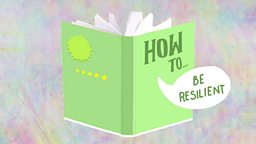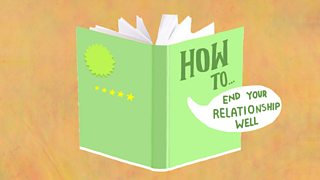‘If you never fail, you never learn’: How to build your resilience
Is resilience something we’re born with, or do our life experiences help shape it? And what can we do to build more? It’s been a challenging year for many so for the latest instalment of our How To series Woman’s Hour spoke to three women who’ve had their resilience put to the test.
Author and journalist Elizabeth Day has become an expert in learning from failure through her How to Fail podcast and books on the subject; Paralympian Martine Wright MBE lost both her legs in the 7/7 London bombings and now mentors others facing life-changing operations; and psychologist Emma Kenny has had personal experience putting her professional knowledge into practice after the recent death of her dad. They shared some of the key things they’ve learned about building resilience…

Accept that failure is inevitable
“Failure, at some point in all our lives, is beyond our control. But we are in control of our response to it,” says Elizabeth Day, who was inspired to explore failure more deeply after her own experiences with a break-up, divorce and unsuccessful IVF.
“That starts with acceptance. You have to accept the situation that you find yourself in, as hard and devastating and grief stricken as that might be, and then you can teach yourself how to adapt.”
“Don’t bury your head in the sand,” adds psychologist Emma Kenny. “Embrace it and, if it’s your fault, take responsibility for it."
Remember that you are not your worst thoughts
“We can be sad about failure but we do not have to live in that place of sadness,” says Elizabeth. “We can acknowledge those feelings as part of us, but they do not have to define us.
“Your brain will sometimes respond to failure with a fight or flight anxiety response that isn't always justified. It's like the smoke alarm going off and thinking the house is on fire, when actually it's just burnt toast."
“When life knocks you down, there’s nothing wrong with a bit of self-pity,” adds Emma. “It’s natural to lick your wounds and vent spleen at the unfairness of it all. [It’s about] how you choose to resume with your life thereafter.”
Let yourself be vulnerable and reach out to other people
“We forge connections when we admit that we are not perfect,” says Elizabeth. “Vulnerability, feeling lonely, feeling like a failure in your own life… we all feel it at a certain point, no matter what we look like on the outside. Once you realise that, there's something quite liberating about it.”
“Everyone needs a ‘team me’,” says Paralympian Martine Wright, who was injured in the 7/7 bombings in London in 2005. “My resilience came from my mum, my dad, my brother and sister, my surgeon, the off-duty policewoman that saved my life... The support and the love they give, whether it's a shoulder to cry on or teaching me to walk and take that extra step, that's where resilience comes from.”
“You are not alone,” adds Elizabeth. “And you don’t have to start by talking, you can start by listening.”
Almost everything that goes wrong can teach us something
“It would be monstrous for me to say, ‘everything happens for a reason’,” says Elizabeth. “But I do think that every single failure contains within it a lesson. That doesn't mean there isn't a necessary period of acclimatisation and coming to terms with the thing that you've lost, but [in time] you can learn something from it.”
“Life isn’t about success, it’s about experience,” adds Emma. “Every ‘success story’ has a legacy of car crashes in its wake. Learning from our mistakes is what ensures we don’t go through life repeating them.”

Reframe things from a different perspective
“Reframing is a very handy technique,” says Emma. “Instead of seeing failure as a setback and a reason to throw in the towel, you could regard it as having established one more way of doing something wrong on the road to getting it right – part of the solution rather than part of the problem.”
“Bad things can happen to anyone, but good things can come out of bad,” adds Martine. “One day I was a girl-about-town on the way to work as an international marketing manager, and then eight days later I came out of a coma to look down on the bed and see that my legs had been amputated. How did I get through that? I suppose I'd be a millionaire if I could tell you it was one thing, but there were many things. It's all about belief, belief that things can get better and that we can cope with things.”
Focus on the positive
“Practice gratitude daily,” says Emma. “Think of three things that you are grateful for and one thing that you struggled with but learnt from. This is proven to create positive neural pathways meaning you feel more positive.
“So often we're taught to focus on the negative,” she adds, citing the recent death of her father as an example. “If I focus on his end, there is absolutely no beauty, no joy, nothing. But actually, I had him for so many years and he was the most wonderful human and he taught me so much. I hear him now in everything I do and what he taught me is [that] life is a breath of consciousness, it's a blink of an eye."
Explore healthy coping mechanisms that work for you
“This could be talking things through with a trusted confidante, channelling your frustrations into exercise or something creative, or indulging in a bit of mindfulness and you time,” says Emma.
“Crucially, don’t engage in unhealthy, destructive coping strategies, such as drink or drugs, or taking your hurt and anger out on a loved one, as these behaviours will only reinforce the negative cycle and offer nothing constructive.
“Grow your knowledge. The more you learn, the more you grow."
Anyone can learn resilience
“We don't often believe that we can cope with trauma, that we can face and confront those kind of situations and grow from them - we’re brought up to think that bad times destroy us,” say Emma.
“But actually it opens your eyes in totally unique ways. When you're suddenly confronted with your whole world systemically changing and falling apart, you realise that somewhere deep in your DNA is this desire to survive, and not just survive, to kind of thrive and to grow. It’s really life-affirming in the most horrible way. And anybody can learn it, that’s the key. Anybody can learn resilience.”
And remember: “If you never fail, you never learn,” says Elizabeth.
Listen to the full Woman’s Hour discussion on resilience on ±«Óãtv Sounds now, where you’ll also find any of the other episodes you may have missed. To join the conversation, follow us @bbcwomanshour on and .




